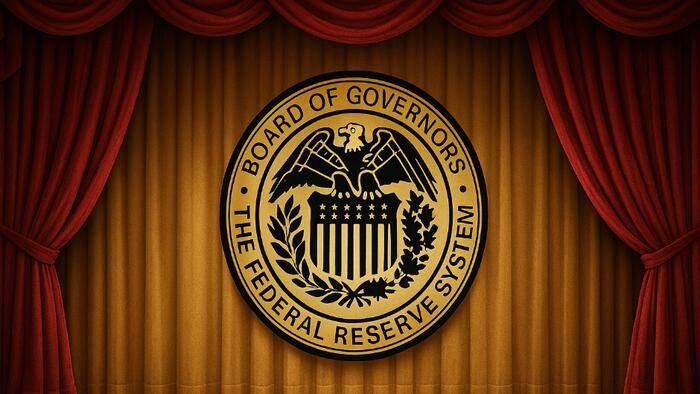Copyright ZeroHedge

The Federal Reserve cut rates again last week and announced an end to quantitative tightening, despite inflation running at 3%, which is nowhere near the Fed's supposed 2% target. Jerome Powell even invented a new metric he calls "inflation minus tariffs" to justify continued monetary stimulus in the face of a weakening job market. Meanwhile, Americans remain bitterly divided over what these symptoms, with left and right fighting about bailouts, immigration, student loans, and social programs – while missing the cause of the disease entirely. As Marty Bent writes, "The evil capitalists aren't r*ping the working class, centralized control of money is." Both sides fail to recognize that centrally planned fiat currency is the common precursor to every dysfunction they're fighting about. Bitcoin offers a peaceful third path: mathematical certainty in place of broken political promises. The working class can save without debasement. Businesses must compete for labor with fair wages rather than importing cheaper alternatives. Universities face real market discipline. Powell's rate cuts only accelerate bitcoin's inevitability. Fix the money, fix the world. Prosecutors seek maximum sentence for Samourai Wallet founders in privacy crackdown U.S. prosecutors are demanding five-year prison sentences for Keonne Rodriguez and William Lonergan Hill, creators of Samourai Wallet, after the developers pled guilty to operating an unlicensed money-transmitting business. Authorities claim the non-custodial bitcoin privacy wallet processed $237 million in illicit funds, while the founders insist they built tools to protect digital privacy and never took custody of user funds. Code is not a crime The government's aggressive prosecution of developers who never held customer funds sets a dangerous precedent that criminalizes privacy-enhancing technology itself. By seeking maximum sentences for building non-custodial software, authorities signal that financial surveillance is a mandatory feature of daily life and bitcoin's core promise of permissionless, private transactions is under direct attack from the state. Gemini to launch prediction markets, adding another layer to the Wall Street crypto casino Cryptocurrency exchange Gemini is planning to enter the prediction market sector, joining a growing list of financial and tech firms seeking to capitalize on the industry's recent explosion. The move follows platforms like Polymarket processing over $8 billion in bets during the 2024 election cycle, with Trump Media and others also announcing plans to launch similar products. Betting on everything is the business model Financial institutions continue engineering new ways to turn every possible outcome into a tradeable derivative – elections, weather, celebrity deaths, sports, you name it. While prediction markets claim to aggregate information efficiently, they also deepen society's involvement with an ever-expanding financial casino where everything becomes a speculative instrument. Bitcoin offers a fundamentally different path: sound money with a fixed supply that can't be leveraged, rehypothecated, or gamified into oblivion. Russia emerges as bitcoin mining superpower, now controls 15% of global hashrate A new report from Blockspace reveals Russia has quietly become the world's second-largest bitcoin mining hub, controlling 15.51% of global hashrate behind only the United States. The country's mining industry has surged following China's 2021 mining ban, with major players such as BitRiver, Intelion, and Promminer consuming 2.5 gigawatts of power, though significant unregistered mining activity suggests the true scale is even larger. Sanctions create unexpected bitcoin mining boom Western sanctions following the Ukraine invasion inadvertently turbocharged Russia's mining sector by creating a domestic natural gas surplus that miners are now tapping at rates as low as $20 to $30 per megawatt hour, which is less than half the Texas average. Meanwhile, U.S. bitcoin miners are increasingly pivoting their infrastructure toward AI and high-performance computing, potentially ceding more ground to Russia and China in the global hashrate race. When governments weaponize financial systems and sanctions, bitcoin mining simply follows the path to the cheapest energy available, proving once again that hash power flows where it's economically efficient, regardless of geopolitical boundaries or authoritarian control. Trump administration goes all-in on bitcoin, calls it "industry of the future" President Trump doubled down on his commitment to U.S. bitcoin dominance in a 60 Minutes interview, stating "I only care about one thing: will we be number one in bitcoin," while defending his pardon of Binance founder CZ as necessary to end the Biden administration's war on the industry. Meanwhile, White House bitcoin and AI Czar David Sacks called bitcoin and crypto "the industry of the future," criticizing the previous administration's "regulation by enforcement" approach and pledging to establish clear regulatory frameworks that keep innovation onshore. Political class finally recognizes bitcoin's inevitability After years of Elizabeth Warren-style hostility, Washington's power brokers are racing to position themselves on the right side of history. Trump credited the "bitcoin vote" with helping secure his election, while Sacks noted that entrepreneurs consistently ask for one thing: clear rules, not persecution. The Strategic Bitcoin Reserve, pardons, and the pivot from enforcement to clarity signal that bitcoin has transcended partisan politics to become essential national infrastructure – proof that bitcoin doesn't need politicians, but politicians increasingly need bitcoin. BITCOIN ADOPTION CONTINUES Rotterdam-based crypto asset manager Blockrise announced it will focus entirely on bitcoin, ending support for Ethereum and other crypto assets. Strive Asset Management raised $160 million through an upsized preferred stock offering with proceeds earmarked for bitcoin and bitcoin-related investments, adding to its existing treasury of 5,958 coins. Venezuela's Conexus, which handles 40% of the country's electronic transfers, plans to integrate bitcoin and stablecoins into the banking network, offering custody services to bank customers. Fold partnered with Steak 'n Shake to offer customers $5 in bitcoin rewards when they purchase a Bitcoin Meal or Steakburger at any of 1,200+ U.S. locations. Coinbase purchased nearly $300 million in bitcoin during Q3, adding 2,772 bitcoins to its corporate treasury with CEO Brian Armstrong confirming the exchange "keeps buying more." Bitcoin miner Cipher Mining secured a $5.5 billion, 15-year lease with Amazon Web Services to deliver 300 megawatts of AI computing capacity by 2026. Swiss Bitcoin treasury company FUTURE raised CHF 28 million ($34 million) to build what it calls "Europe's premier Bitcoin treasury platform" for institutional investors. BlackRock is launching its iShares Bitcoin ETF on Australia's ASX in mid-November, expanding its global bitcoin strategy to Asia-Pacific. HOW BITCOIN WORKS Learn one key idea about bitcoin each week. This week: Bitcoin’s “Silent IPO” Investor Jordi Visser recently published a compelling analysis explaining bitcoin's current price consolidation: the network is experiencing its version of an Initial Public Offering. In traditional markets, an IPO marks the moment when early investors and founders cash out, transferring ownership to a broader base of institutional and retail buyers. The stock often consolidates during this distribution period, frustrating observers who wonder why it isn't rallying with the broader market. But what if what seems like a failure is a sign of bitcoin’s maturation? Bitcoin never had a traditional IPO because it never had a company, but economic forces don't disappear just because the structure is different. For years, bitcoin's early adopters (those who accumulated when it was a cypherpunk experiment) couldn't exit large positions without destroying the market. The liquidity simply didn't exist. That has now changed. ETFs now provide institutional demand. Corporate treasuries hold bitcoin. Sovereign wealth funds are accumulating. For the first time, early holders can realize life-changing gains without cratering the price. Galaxy Digital recently disclosed that it sold $9 billion worth of bitcoin on behalf of a single customer. On-chain data shows old coins, dormant for years, have started moving around – not in panic, but in a calm, methodical fashion, from large concentrated hodlers to distributed buyers. This shift in ownership concentration makes bitcoin structurally stronger. When thousands of people hold massive positions, one person's decision to sell could move the market. But when millions of people hold smaller positions, the impact diffuses across thousands of transactions over time. Volatility moderates, and stability increases. The wild years of seeing 10x returns in short order may be behind us, but so is the risk of catastrophic collapse from concentrated selling. A distributed holder base is what separates a speculative asset from a durable medium – it’s what allows something to graduate from "magic internet money" to "global reserve asset." Bitcoin's fundamentals remain stronger than ever. Some of the OG whales are having their liquidity event, but what emerges is a bitcoin better-poised for adoption at scale. COIN CHECK In what year did the Federal Reserve adopt its 2 percent annual inflation target? A) 2011 B) 2012 C) 1996 D) 1913 Check your answer at the end of the page. FROM THE MEME POOL Follow us on X for more fresh content ANSWER



